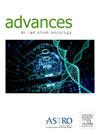Stereotactic Radiation Therapy for the Treatment of Glandular Metastases From Renal Cell Carcinoma
IF 2.7
Q3 ONCOLOGY
引用次数: 0
Abstract
Purpose
The optimal management strategies for glandular metastases in patients with metastatic renal cell carcinoma (mRCC) are currently unknown. While local therapy may be effective, there is a paucity of data on Stereotactic Ablative Body Radiation (SABR) particularly considering the risks of duodenal injury and adrenal insufficiency with high-dose radiation in these locations.
Methods and Materials
We conducted an institutional review board-approved, single-institution, retrospective study of patients with RCC metastases to the adrenal and pancreas treated with SABR. Data on patient characteristics, therapies, toxicities, and outcomes were collected and analyzed. Outcome of patient with SABR-treated mRCC was compared between those with and without glandular metastasis.
Results
A total of 46 patients with a median follow-up of 20 months with mRCC were included with 36 adrenal and 19 pancreatic metastases treated with SABR with a median dose of 40 Gray (Gy) delivered in 5 treatments. One-year overall survival was 82.2%, progression-free survival was 48.2%, and local control was 95.9%. Acute grade 2 and 3 toxicity related to SABR was 7.4%. One patient experienced a grade 3 duodenal bleed as a result of pancreatic SABR, whereas 6.1% of patients experienced adrenal insufficiency with a median time to onset of 4 months following adrenal SABR.
Conclusions
SABR for RCC metastases to the pancreas and adrenal gland is feasible, safe, and effective at achieving high rates of local control with a small risk of duodenal injury and adrenal insufficiency, respectively. Oncological outcomes of patients with SABR-treated mRCC with glandular metastasis were comparable to those without glandular metastasis.
立体定向放射治疗肾细胞癌腺体转移
目的转移性肾细胞癌(mRCC)患者腺体转移的最佳治疗策略目前尚不清楚。虽然局部治疗可能有效,但缺乏立体定向消融体辐射(SABR)的数据,特别是考虑到在这些部位使用高剂量辐射可能造成十二指肠损伤和肾上腺功能不全的风险。方法和材料我们进行了一项机构审查委员会批准的单机构回顾性研究,研究对象是接受SABR治疗的肾细胞癌转移至肾上腺和胰腺的患者。收集和分析患者特征、治疗方法、毒性和结果的数据。sabr治疗的mRCC患者的预后与有无腺转移的患者进行比较。结果共纳入46例mRCC患者,中位随访时间为20个月,其中36例肾上腺转移灶和19例胰腺转移灶采用SABR治疗,5种治疗方案中位剂量为40 Gy。一年总生存率为82.2%,无进展生存率为48.2%,局部控制率为95.9%。与SABR相关的急性2级和3级毒性为7.4%。1例患者因胰腺SABR发生3级十二指肠出血,而6.1%的患者发生肾上腺功能不全,肾上腺SABR后发病的中位时间为4个月。结论ssabr治疗肾细胞癌转移至胰腺和肾上腺可行、安全、有效,局部控制率高,十二指肠损伤和肾上腺功能不全风险小。sabr治疗伴有腺转移的mRCC患者的肿瘤预后与没有腺转移的患者相当。
本文章由计算机程序翻译,如有差异,请以英文原文为准。
求助全文
约1分钟内获得全文
求助全文
来源期刊

Advances in Radiation Oncology
Medicine-Radiology, Nuclear Medicine and Imaging
CiteScore
4.60
自引率
4.30%
发文量
208
审稿时长
98 days
期刊介绍:
The purpose of Advances is to provide information for clinicians who use radiation therapy by publishing: Clinical trial reports and reanalyses. Basic science original reports. Manuscripts examining health services research, comparative and cost effectiveness research, and systematic reviews. Case reports documenting unusual problems and solutions. High quality multi and single institutional series, as well as other novel retrospective hypothesis generating series. Timely critical reviews on important topics in radiation oncology, such as side effects. Articles reporting the natural history of disease and patterns of failure, particularly as they relate to treatment volume delineation. Articles on safety and quality in radiation therapy. Essays on clinical experience. Articles on practice transformation in radiation oncology, in particular: Aspects of health policy that may impact the future practice of radiation oncology. How information technology, such as data analytics and systems innovations, will change radiation oncology practice. Articles on imaging as they relate to radiation therapy treatment.
 求助内容:
求助内容: 应助结果提醒方式:
应助结果提醒方式:


